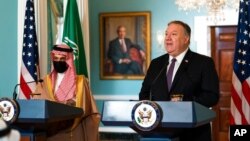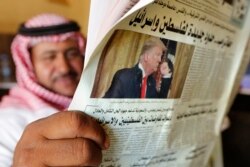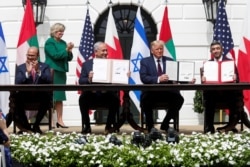Secretary of State Mike Pompeo made clear the U.S. is strengthening its ties with the Kingdom of Saudi Arabia, announcing plans to build a new U.S. Embassy in the capital, Riyadh.
Pompeo on Wednesday welcomed Saudi Foreign Minister Prince Faisal bin Farhan Al Saud to the State Department for the start of a strategic dialogue, citing what he called "proof" of mutual plans to further expand the 75-year-old partnership between the two countries.
"The United States is preparing to acquire a 26-acre site for a new U.S. Embassy in Riyadh," Pompeo said in a prepared statement. "This project, along with the recent opening of a new consulate in Jeddah and the ongoing construction of a new consultant in Dhahran, represents a U.S. investment of over $1 billion."
Pompeo's announcement comes as he faces ongoing criticism from some lawmakers for pushing arms sales to Saudi Arabia through the Senate in May 2019. The Senate had voted to block the sales, citing concerns about the Saudi killing of Washington Post columnist Jamal Khashoggi, other human rights abuses and the civilian suffering associated with the Saudi-led war in Yemen. The Trump administration provided more than $8 billion in weapons to Riyadh as part of an emergency declaration that the secretary said was necessary to counter threats from Iran.
Pompeo made clear there will be more U.S. arms sales to come.
"The United States supports a robust program of arms sales to Saudi Arabia, a line of effort that helps the kingdom protect its citizens and sustains American jobs," he said.
Human rights activists and a number of lawmakers have called for the U.S. to fundamentally review its relationship with Riyadh. Yasmine Farouk, a visiting scholar at the Carnegie Endowment for International Peace, told VOA everything she heard from Pompeo on Wednesday sends a clear signal that the only review the Trump administration is conducting is on how much to increase and expand arms sales and bilateral ties.
"I see it as sending this message that we're going to do more," she said. "We're doubling down on this relationship and not going to do less."
Prince Faisal defended his country's military operations in Yemen as self-defense.
"The Iranian regime continues to provide financial and material support to terrorist groups, including in Yemen where the Houthis have launched more than 300 Iranian-made ballistic missiles and drones towards the kingdom," he said.
Shortly after Pompeo's meeting with Prince Faisal on Wednesday, U.S. and Saudi officials announced that two Americans held hostage by Iran-backed Houthi militants in Yemen were freed as part of a U.S.-backed trade that returned more than 200 Houthis to Yemen. The deal won the release of Sandra Loli, an American humanitarian aid worker who was held hostage by the Houthis for about three years, and Mikael Gidada, a U.S. businessman who was held for about a year.
After the signing last month of the Abraham Accord that established diplomatic ties between Israel, the United Arab Emirates and Bahrain, Pompeo encouraged Saudi Arabia to follow suit.
"We hope Saudi Arabia will consider normalizing its relationships as well, and we want to thank them for the assistance they've had in the success of the Abraham Accords so far," Pompeo said, adding that he hopes the nation will encourage Palestinian leaders or the Palestinian Authority to return to negotiations with Israel.
Farouk said she thinks it is significant that Pompeo thanked the Saudis for their assistance with the Abraham Accords, even though the public statements coming out of Riyadh condition the opening of a Saudi-Israeli relationship on the resolution of the Israeli-Palestinian conflict.
"In practical steps, the kingdom has been incrementally changing its policy and its approach to the Israeli-Palestinian conflict, trying to separate a relationship with Israel from its position on the conflict," she said.
At a congressional hearing last month on the U.S.-Saudi relationship, Bruce Riedel of the Brookings Institution said Washington is in a new and different relationship with Riyadh today than anything he has seen in the past 75 years.
"Saudi Arabia today, under King Solomon, and his son MBS, [Mohammed bin Salman] the Crown Prince, has embarked on a series of foreign policies, which are reckless and dangerous," said Riedel. "Most importantly, [they] are inimical to America's vital interests in the Middle East and in the world."






